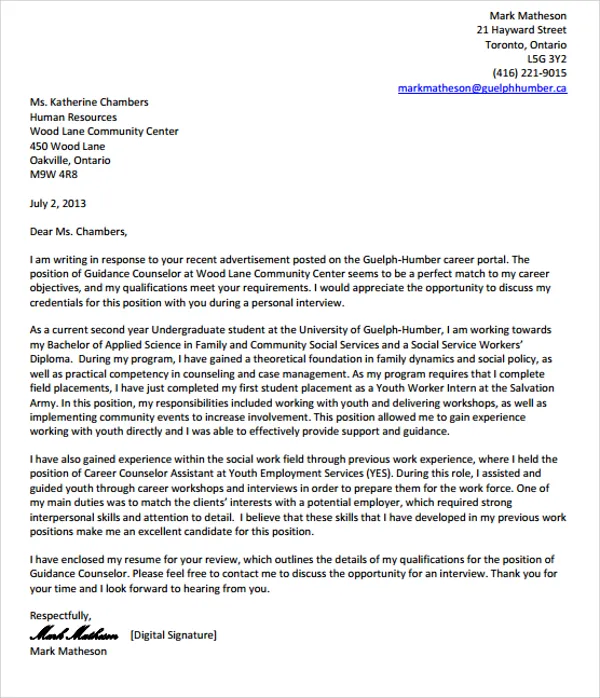Understanding the Child Protection Social Worker Role
A Child Protection Social Worker plays a crucial role in safeguarding children and ensuring their well-being. They investigate reports of child abuse and neglect, assess risks, and intervene to protect children from harm. This profession demands a profound commitment to children’s rights, a strong sense of ethics, and the ability to navigate complex and emotionally challenging situations. Child Protection Social Workers work closely with families, schools, law enforcement, and other professionals to provide support, resources, and interventions aimed at keeping children safe and promoting their healthy development. They must be skilled communicators, able to build rapport with children and families while remaining objective and professional.
Key Responsibilities of a Child Protection Social Worker
The responsibilities of a Child Protection Social Worker are diverse and demanding. They include assessing reports of child abuse or neglect, conducting investigations to determine the validity of allegations, and evaluating the safety of children in their homes. Social workers develop and implement safety plans, working with families to address identified risks and improve parenting skills. They may also remove children from dangerous situations, providing temporary or permanent care. Court involvement is common, requiring them to prepare reports, present evidence, and testify in court. Additionally, they collaborate with other agencies and professionals, such as teachers, doctors, and law enforcement, to coordinate services and ensure children’s needs are met. Record-keeping, report writing, and case management are integral to their daily duties, ensuring accurate and detailed documentation of all interactions and interventions.
Essential Skills for Child Protection Social Workers
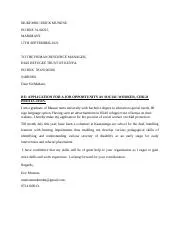
Child Protection Social Workers require a blend of technical skills, interpersonal abilities, and personal qualities to be effective. Empathy and compassion are paramount, enabling them to connect with children and families facing difficult circumstances. Strong communication skills are essential for interviewing children and adults, writing reports, and advocating for children’s needs. Critical thinking and problem-solving skills are vital for assessing complex situations, identifying risks, and making sound judgments. The ability to remain calm and professional under pressure, manage stress, and maintain objectivity is also crucial. Social workers must demonstrate cultural sensitivity, a deep understanding of child development, and knowledge of relevant laws and policies. They often work independently but must also possess strong teamwork skills, collaborating effectively with other professionals to provide comprehensive services.
Communication Skills
Effective communication is a cornerstone of success for a Child Protection Social Worker. This includes the ability to actively listen, ask open-ended questions, and build rapport with children and families. Written communication skills are equally important for preparing comprehensive reports, documenting case notes, and writing court submissions. Social workers must adapt their communication style to suit the age and abilities of the individuals involved, using clear, concise language. They must also be skilled at conflict resolution, mediation, and negotiation, resolving disputes and fostering cooperation among different parties. The capacity to explain complex legal and social concepts in a way that is easily understood by diverse audiences is also essential, ensuring that everyone is informed and engaged.
Empathy and Compassion
Empathy and compassion are the bedrock of effective child protection work. Social workers must be able to understand and share the feelings of children and families who are facing difficult circumstances, such as abuse, neglect, and trauma. This requires the ability to put themselves in the shoes of others, acknowledging their pain and validating their experiences. Compassion motivates social workers to provide support, encouragement, and resources to those in need. These qualities foster trust, build relationships, and create a safe space for children and families to express their feelings and needs. Empathy also helps social workers to make informed decisions that prioritize the well-being of the children they serve, demonstrating their commitment to their safety and healthy development.
Critical Thinking and Problem-Solving
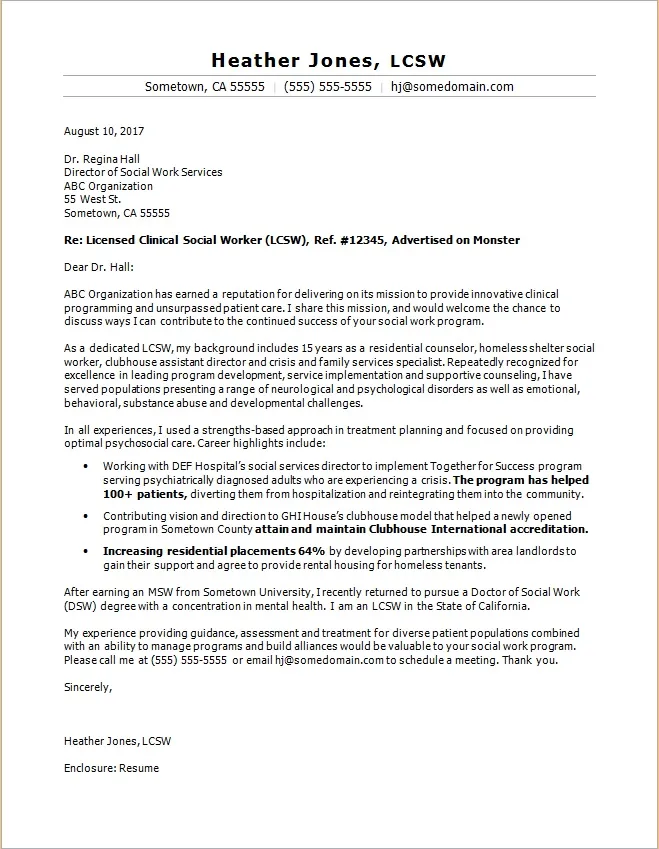
Critical thinking and problem-solving skills enable social workers to analyze complex situations, identify underlying issues, and develop effective solutions. They must be able to gather and evaluate information from multiple sources, including interviews, observations, and records. This skill set involves assessing risks, evaluating the safety of children, and determining the appropriate course of action. Social workers must be able to think creatively, consider different perspectives, and develop innovative strategies to address challenges. They must also be able to adapt their approach as new information becomes available and to learn from their experiences. These skills allow social workers to make informed decisions, protect children from harm, and promote their well-being.
Building Your Child Protection Social Worker Cover Letter
A well-crafted cover letter is crucial for making a strong first impression and securing an interview for a Child Protection Social Worker position. It should highlight your relevant skills and experience, demonstrating your passion for protecting children and your understanding of the role. Your cover letter provides an opportunity to explain why you are the best candidate, showcasing your qualifications and aligning them with the specific requirements of the job. By tailoring your letter to each position, you demonstrate your genuine interest and increase your chances of standing out from the competition, making it an essential tool in your job search.
Header and Contact Information
Begin your cover letter with a professional header that includes your name, address, phone number, and email address. Make sure this information is accurate and easy to read. Include the date and the hiring manager’s name, title, and the organization’s address, if known. Using a professional format demonstrates attention to detail and respect for the potential employer. The header establishes your identity and contact details clearly, ensuring that the employer can easily reach you. This section is often overlooked, but a well-formatted header makes your cover letter look professional and helps it stand out positively.
Personalized Greeting
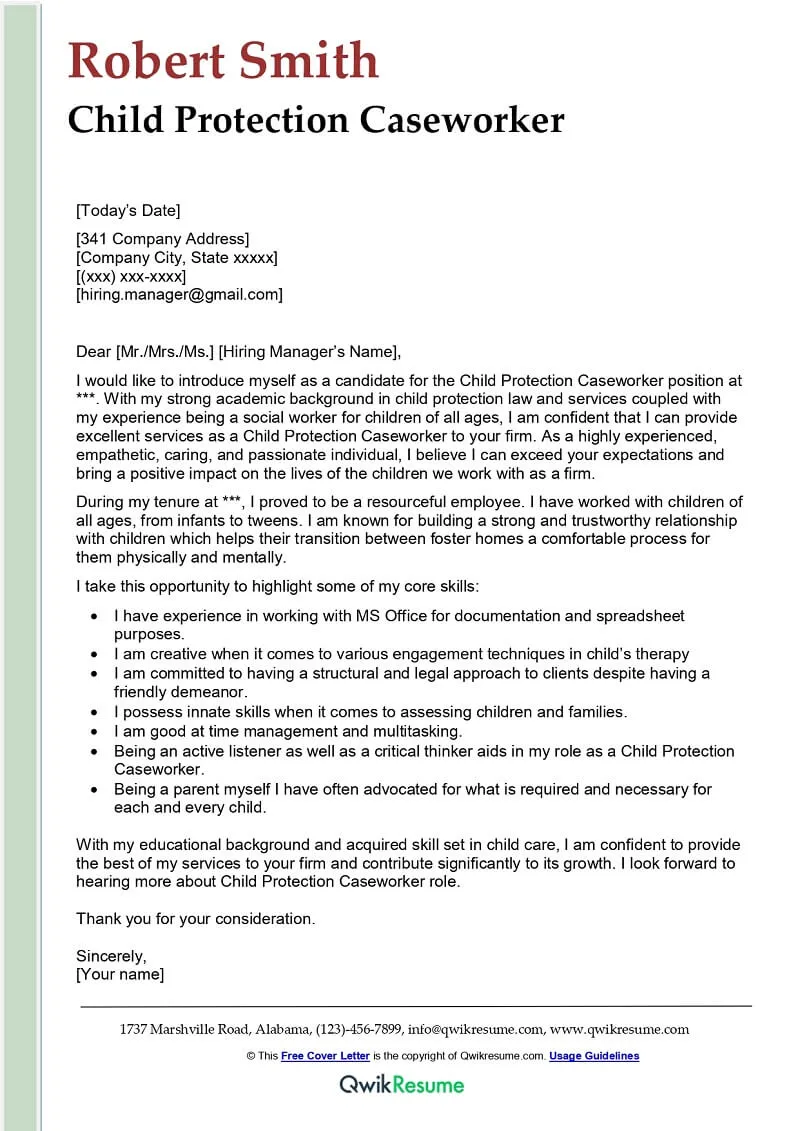
Address the hiring manager by name whenever possible. Research the company and identify the person responsible for hiring. If you cannot find a name, use a professional greeting such as “Dear Hiring Manager.” Avoiding generic greetings, such as “To Whom It May Concern,” demonstrates that you have taken the time to personalize your application. It shows initiative and a genuine interest in the specific opportunity. A personalized greeting immediately grabs the reader’s attention and sets a more personal tone, making your cover letter more engaging.
Opening Paragraph: Captivating the Reader
Start your cover letter with a strong opening paragraph that immediately grabs the reader’s attention. State the position you are applying for and briefly explain why you are interested in the role. Mention your key skills and experience that align with the job requirements. Consider highlighting a recent achievement or a specific instance that demonstrates your commitment to child protection. Make your opening concise, enthusiastic, and compelling to encourage the hiring manager to continue reading. A well-crafted opening creates a positive first impression and sets the tone for the rest of your cover letter.
Highlighting Relevant Experience
In the body of your cover letter, elaborate on your relevant experience, using specific examples to demonstrate your abilities. Describe your previous roles, focusing on the responsibilities and accomplishments most relevant to the Child Protection Social Worker position. Provide details on your experience in conducting investigations, assessing risks, working with families, and collaborating with other professionals. Quantify your achievements whenever possible, such as the number of cases you managed or the successful outcomes you achieved. This section should show the hiring manager how your past experiences have prepared you for the role.
Showcasing Relevant Skills
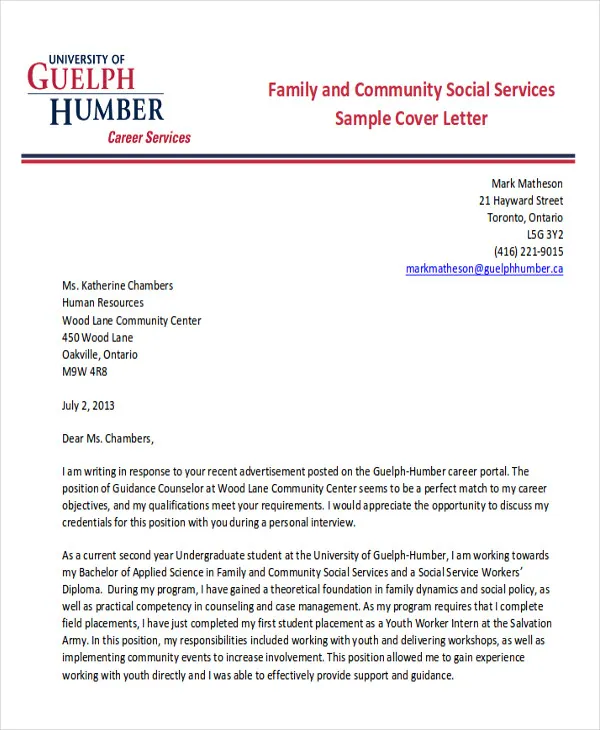
Identify and showcase the skills most relevant to the job description. Emphasize your communication, critical thinking, problem-solving, and empathy skills. Provide examples of how you have applied these skills in previous roles. Discuss your ability to work under pressure, manage difficult situations, and maintain a professional demeanor. Mention any specific training or certifications you have obtained. By highlighting your core competencies, you demonstrate that you possess the necessary qualifications to succeed in the role. Remember to match your skills with the requirements of the job and provide evidence to support your claims.
Quantifying Achievements
Use quantifiable metrics to showcase your achievements. Whenever possible, provide specific numbers and data to demonstrate the impact of your work. For example, you could mention the number of cases you successfully closed, the percentage of families you helped to reunify, or the reduction in repeat incidents of child abuse. Use these numbers to illustrate your effectiveness and highlight your value as a candidate. Quantifying your achievements provides concrete evidence of your abilities, making your cover letter more persuasive and memorable. This approach allows employers to see the tangible results of your work.
Demonstrating Passion for Child Protection
Express your genuine passion for child protection and your commitment to safeguarding children’s well-being. Share your motivations for pursuing this career path and describe what drives you to make a difference. Explain why you are drawn to the organization and what appeals to you about their mission. Provide examples that show your dedication to the cause, such as volunteer work, advocacy efforts, or personal experiences. Demonstrate that you are not only qualified but also deeply committed to the work. A sincere display of passion can make your cover letter more compelling and help you stand out from other candidates.
Closing Paragraph: Call to Action
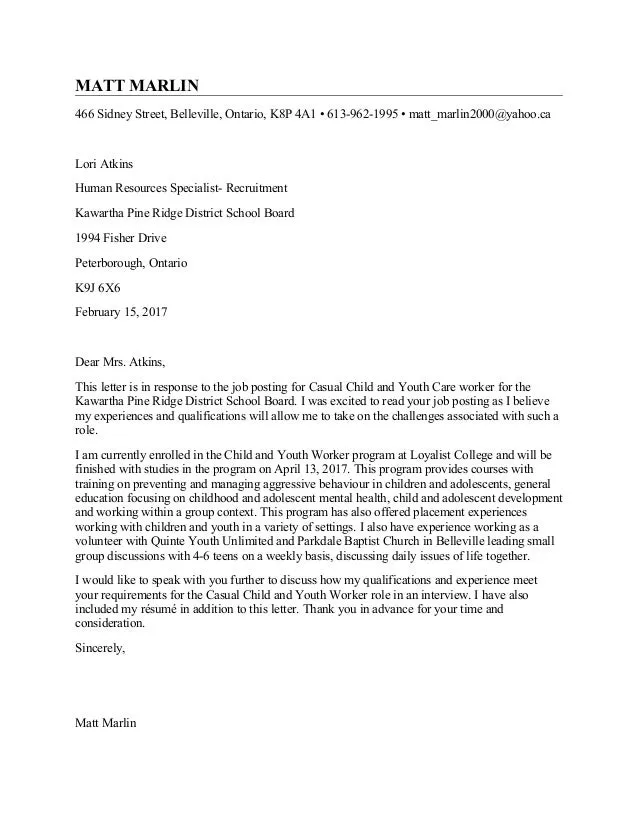
End your cover letter with a strong call to action. Reiterate your interest in the position and thank the hiring manager for their time and consideration. Express your enthusiasm for the opportunity to discuss your qualifications further and state your availability for an interview. Include a clear and concise statement about how you can be reached. This action reinforces your eagerness and leaves a positive impression. A strong closing paragraph can increase your chances of receiving an interview and moving forward in the application process.
Proofreading and Editing Your Cover Letter
Before submitting your cover letter, carefully proofread and edit it to eliminate any errors in grammar, spelling, and punctuation. Ensure your writing is clear, concise, and easy to understand. Check for consistency in formatting and style. Consider having a friend or colleague review your letter for feedback. A polished and error-free cover letter shows your attention to detail and professionalism. Proofreading is essential to prevent mistakes that could detract from your qualifications and damage your chances of getting an interview. Attention to detail can separate your cover letter from the competition.
Common Mistakes to Avoid in Your Cover Letter
Avoid common mistakes that can undermine the effectiveness of your cover letter. Ensure your writing is clear, concise, and free of errors. Tailor your letter to the specific job description, highlighting relevant skills and experiences. Refrain from using generic language or overly formal phrasing. Use a positive and enthusiastic tone, and focus on what you can bring to the role. By avoiding these pitfalls, you can enhance the impact of your cover letter and increase your chances of getting an interview.
Using Generic Language
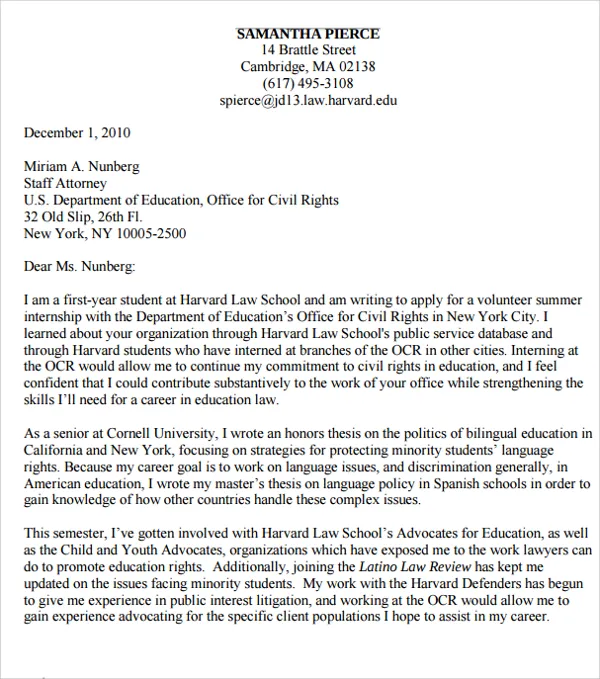
Avoid using generic phrases that lack specificity or personality. Phrases like “I am a team player” or “I am hard-working” are vague and do not provide any unique insights into your skills or experience. Instead, provide concrete examples to demonstrate these qualities. Use action verbs and specific details to showcase your achievements and abilities. Tailor your language to the specific requirements of the job, demonstrating that you have the necessary skills and knowledge. Using generic language makes your cover letter sound impersonal and forgettable.
Focusing on Yourself Too Much
While it is important to highlight your skills and experience, avoid making your cover letter all about you. Frame your accomplishments in terms of how they benefit the employer. Focus on what you can contribute to the organization and how you can help them achieve their goals. Show that you understand the needs of the employer and how your skills and experience align with those needs. Demonstrate your genuine interest in the organization and the role, showcasing that you are a good fit for their culture. Keep the focus on the employer’s needs and how you can contribute to their success.
Failing to Tailor Your Letter
Do not use a generic cover letter for every job application. Tailor your letter to each specific position, highlighting the skills and experiences that are most relevant to the job description. Research the organization and customize your letter to reflect your understanding of their mission and values. By tailoring your letter, you demonstrate that you are genuinely interested in the role and that you have taken the time to understand the employer’s needs. The ability to match your skills and experiences to the job requirements is crucial. Failing to do so makes your application look impersonal and less likely to succeed.
Reviewing Child Protection Social Worker Cover Letter Examples
Reviewing cover letter examples for Child Protection Social Workers can provide valuable insights and guidance. Analyze successful cover letters to understand their structure, content, and style. Pay attention to how the writers highlight their skills, experiences, and passion. Use these examples as a template, but be sure to personalize your own letter. Research various sources, including online job boards and career websites, to find relevant examples. These examples can help you to identify common mistakes and improve the overall quality of your cover letter. Adapting best practices will give you a competitive edge.
Cover Letter Template for Child Protection Social Worker
Use a cover letter template as a starting point, but always customize it to fit your qualifications and the specific job description. Start with your contact information and the date. Include a personalized greeting. In the first paragraph, state the position you are applying for and express your interest. In the body paragraphs, highlight your relevant skills, experience, and achievements. Quantify your accomplishments whenever possible and demonstrate your passion for child protection. End with a call to action, expressing your availability for an interview. Proofread and edit your letter carefully before submitting it. Adapting a template ensures that you address the necessary elements while keeping it unique.
Tips for Tailoring Your Cover Letter to the Job
Tailor your cover letter to each specific job. Review the job description carefully and identify the key skills, experiences, and qualifications that the employer is seeking. Highlight the aspects of your background that directly align with these requirements. Use keywords from the job description and demonstrate your understanding of the organization’s mission and values. Show that you have researched the organization and understand the role and its responsibilities. Tailoring your cover letter demonstrates your genuine interest and makes you a more competitive candidate. By customizing your letter, you increase your chances of capturing the hiring manager’s attention.
Researching the Employer
Before writing your cover letter, research the organization you are applying to. Visit their website, read their mission statement, and learn about their values and programs. Understand the specific needs of the organization and the challenges they face. Tailor your cover letter to reflect your understanding of these aspects. Identify the key people and projects that are relevant to the role. This research enables you to demonstrate your knowledge, enthusiasm, and commitment, setting you apart from other applicants. It shows that you are genuinely interested in the organization and that you have taken the time to understand its mission.
Matching Skills to Job Requirements
Carefully review the job description and identify the required skills and experiences. Make a list of your own skills and experiences and match them to the job requirements. In your cover letter, highlight the skills that align with the job description. Provide specific examples of how you have used those skills in the past. Quantify your achievements whenever possible to demonstrate your effectiveness. Use the same keywords and phrases that are used in the job description. Matching your skills to the job requirements shows that you understand the role and that you possess the necessary qualifications. This approach demonstrates that you are a good fit for the position.
The Importance of a Strong Cover Letter for Social Workers
A strong cover letter is essential for social workers seeking employment, as it is often the first impression a potential employer receives. It provides an opportunity to showcase your skills, experience, and passion for the profession. A well-crafted cover letter can make you stand out from other candidates and increase your chances of getting an interview. Social work involves communicating effectively and showing empathy; your cover letter is a prime opportunity to demonstrate these key characteristics. A strong cover letter can transform a good resume into an outstanding application, playing a crucial role in landing you the job of your dreams. Ensure yours is polished, tailored, and highlights your best qualities.
